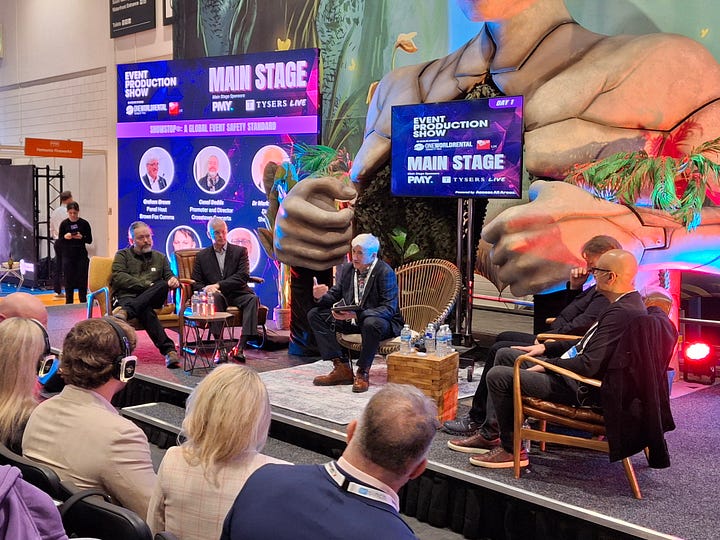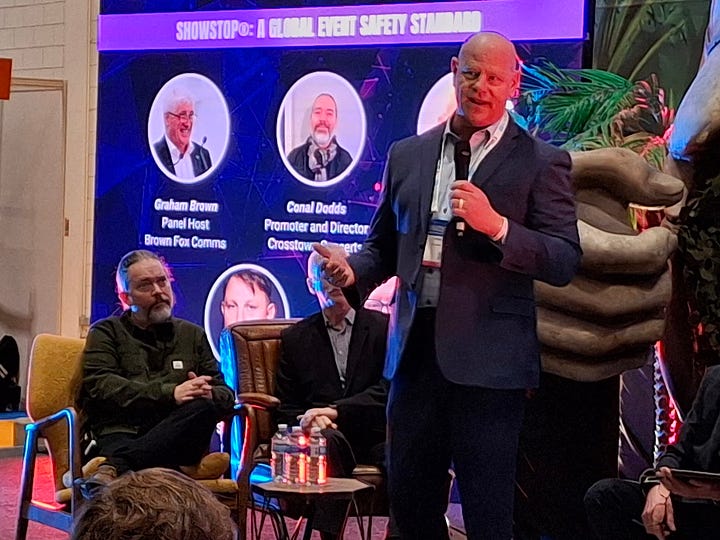How do you say, ‘Stop the show!’
An expert panel at this year’s EPS discussed why a new qualification, Showstop, should become a global standard and ensure live event organisers send their crowds home safely.
Who will ask Sir Paul McCartney to stop playing ‘Let it Be’ at a concert, because someone in the audience is in danger? Or Noel and Liam Gallagher of Oasis as they launch into ‘Champagne Supernova’ in front of an adoring but “energetic” crowd? A discussion at the Event Production Show (EPS) this February explored these and other crowd safety dilemmas at the launch a new qualification which certifies event professionals in this lifesaving discipline. Its developers, supported by audience safety campaigners, hope Showstop Procedure will become an international standard at events.


To underscore the gravity of the issue, Brian Dubiski of US campaign group Pink Bows Foundation opened the session. His daughter, Madison, was one of 10 fans killed in a crowd crush at the 50,000 capacity Astroworld Festival, Houston, Texas, in 2021, as rapper Travis Scott performed. He emphasised the foundation’s motto – a wholly reasonable expectation tragically thwarted on this occasion - “Every crowd deserves to return home safely”.
Among the panellists were two of the qualification’s developers: Mark Hamilton has been Sir Paul’s touring security director since 1989 and was MD of ground operations at the London 2012 Olympics, while Steve Allen is a crowd safety consultant and was Oasis’s security chief for many years, starting with their ‘Be Here Now’ tour of 1997-1998. They were joined by Conal Dodds, of Crosstown Concerts, a promoter of Oasis’s early shows including their 125,000 concerts at Knebworth, who now promotes over 600 events per year, and Steve Durham, co-founder of the 70,000 event We Are FSTVL. Graham Brown of Brown Fox Comms compered the session.
The panellists described how, as Live Nation’s Astroworld demonstrated, even a mature organisation with an experienced team can fail. They identified common areas of confusion at events including delays in the chain of command – exactly who is responsible for calling a ‘Showstop’, does the responsible individual have the respect of the performer, promoter and venue, and what should the artist do in such a situation?
Hamilton said he has successfully stopped over 30 shows in his career. “The single person responsible must act decisively, act rapidly and have the trust of the organising team.” He and Steve Allen laid the foundations of the procedure at a 1997 Oasis show in Scotland. “I knew Oasis attracted energetic crowds,” said Allen. “But this particular show was different [especially boisterous]. Mark, who was running [venue] security and I agreed the procedure. I told Noel and Liam, ‘If I give the sign, there’s a reason to stop the show. It means this is life-critical; I’m not doing it to spoil your night.’ The band were completely behind it.” It was then that the two security professionals coined the term Showstop, and the procedure has been used by some organisers ever since. They are now hoping it becomes standard practice throughout the industry and that the qualification, approved by the International Institute of Risk & Safety Management (IIRSM), becomes a requirement for event organisers.
Dodds believes that the procedure should be standard at small to medium sized events, as well as big shows: “I did a Showstop at a 1,000 capacity club. It was a new venue with a young band. The barrier moved and I could see that we needed to stop the show. It should be part of every event plan. It’s important to work out, who is the Showstop manager? We wouldn’t expect First Aiders at the show who didn’t have training. Why should we not insist a person who stops a show is qualified? If it’s not a trained role the designated person might feel too nervous to stop the show.”
Both Allen and Hamilton emphasised that a Showstop does not necessarily mean the end of the event. “Potential crises can come from different areas. The Event Safety Officer needs direct communication with the Showstop team. And the artist needs to know what’s going on: they’ll ask, ‘What should I do, walk off?’ If that would cause a public order issue, the answer may be, ‘No.’”
Durham also emphasised the importance of involving artists in the procedure. “I had one experience when the council asked us to stop the show 15 minutes early. The DJ performing was not someone who took kindly to an early finish. I was public enemy No. 1! But I should have engaged with him in advance. There is a similar knowledge and qualifications gap [throughout the industry].” He said that this summer’s We Are FSTVL will be the first festival to insist on using Showstop.
Hamilton pointed out that implementing the procedure can have knock-on benefits for an event. “Once a Showstop-qualified person is in place, an organisation will look at its entire decision-making architecture. They have a qualified person testing an organiser’s ability to respond.”
The panel agreed that the value of the Showstop, over and above the incalculable worth of saving human lives, added value to an organisation by mitigating risks and improving decision-making procedures. Allen, who was an expert witness in legal proceedings surrounding the Astroworld disaster, said that in the event of a severe or fatal accident, an organiser “will be subjected to forensic scrutiny by attorneys and witnesses. How do you prove competence to them?”
Meanwhile, Durham explained that, as well as authorities and law enforcement, insurers played a role in pushing for the adoption of the qualification and may even consider paying for it, where it lowered risk at events.
The Event Production Show (EPS) ran from 26-27 February, 2025, at Excel, London UK.
More information about the Showstop Procedure course and qualification can be found at www.crowdsafety.org.uk
Other links:
brownfoxcomms.co.uk
mikegartside.co.uk
© Mike Gartside




Thanks for a great article Mike - and great to see you briefly last week. Hopefully we're on course for an international standard - and if saves ANY lives, it's worth the effort! Stay safe.